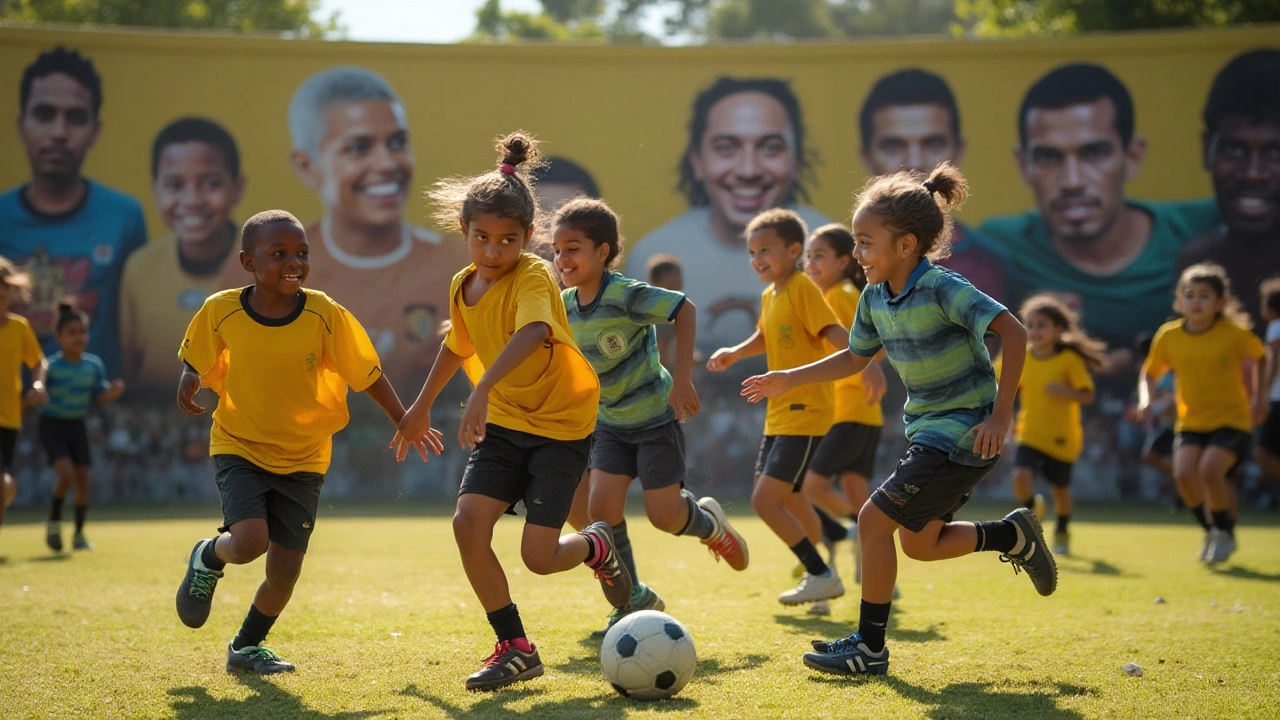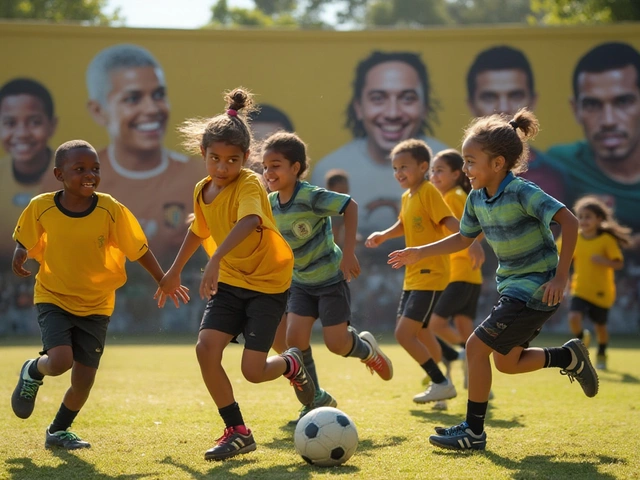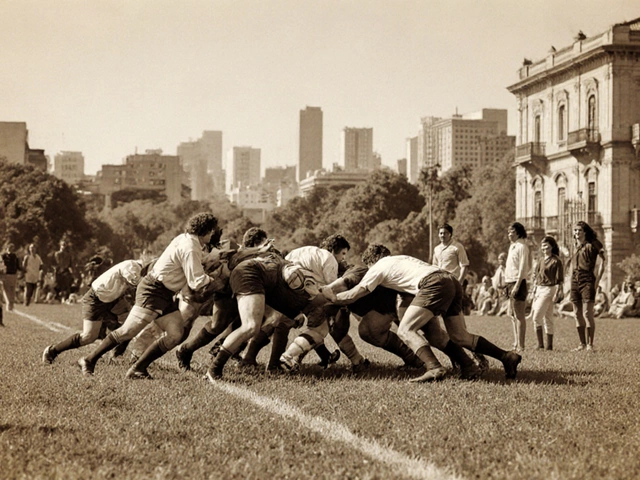Brazil is a nation renowned for its deep-rooted passion for soccer, yet there's an exciting undercurrent brewing that might catch the eyes of sports enthusiasts - rugby. Though traditionally overshadowed by its more established cousins like soccer and volleyball, rugby has started to capture the attention of many Brazilians.
This shift isn't just a fleeting trend. It’s fueled by the vibrant sports culture in Brazil, combined with international exposure and the country's innate flair for teamwork and strategy. With the inclusion of rugby in the Olympics, a fresh wave of interest and opportunities is emerging across the nation.
- Rugby’s History in Brazil
- Growing Popularity of Rugby
- Key Figures and Teams
- Future Prospects and Opportunities
Rugby’s History in Brazil
The roots of rugby in Brazil stretch back to the late 19th century, though it was a journey marred by challenges and moments of triumph. The game first arrived in Brazil through British and French immigrants who sought to share their passion for the sport in the late 1800s. It is often said that the first rugby match played in Brazil took place in 1891, in São Paulo, between employees of railway companies, a testament to the sport's grounding in Brazil’s history. This initial introduction set the foundation, although it took time for the game to develop a foothold within the local sports culture dominated by soccer.
In the 20th century, rugby in Brazil went through periods of ebb and flow. During the 1930s and 1940s, the sport experienced a lull as soccer firmly took its place as the national passion. However, the post-war period saw a gradual resurgence, spurred by expatriates and local enthusiasts. While rugby clubs began to spring up across São Paulo and Rio de Janeiro, it remained a niche, mostly expatriate-driven sport for many decades. The formation of the Brazilian Rugby Confederation (CBRu) in 1963 marked an effort to organize and promote the sport nationally. Even so, rugby had to compete with other more established sports for attention and resources, which restricted its growth for many years.
A turning point came in the 21st century as international exposure increased significantly, coinciding with Brazil's hosting of major sports events which raised public interest in diverse types of athletic competition. One of the pivotal moments was in 2016, when rugby sevens was included in the Rio Olympic Games, giving the sport much-needed visibility. The inclusion of rugby in the Olympics not only inspired a new generation of players but also caught the eye of local media and sponsors, offering rugby a platform to grow its audience and popularity. Offering rugby at an Olympic stage proved to be a significant catalyst for the sport, blending well with Brazil's own cultural embrace of sporting excellence.
Today, Brazil has a growing number of rugby clubs and leagues. Innovations at the grassroots level, with schools and universities introducing rugby programs, are inspiring the youth to pick up the oval-shaped ball. The Brazilian men's and women’s national rugby teams, known as the Tupis and the Yaras respectively, have started making strides in international competitions. Their efforts are critical in cementing rugby's stature within Brazil's colorful sporting landscape. As the influence of rugby continues to grow, significant figures in the sport, such as Joaquim 'Zeca' Padilha, a former player and coach, have been key advocates and contributors to rugby's progress.
"Rugby in Brazil is not just about the game itself; it's about building communities and fostering values such as respect, teamwork, and discipline," echoed by Joaquim 'Zeca' Padilha, one of Brazil’s rugby stalwarts, in an interview with a local sports journal.
As rugby in Brazil sets its sights on the future, there is burgeoning optimism. Developing infrastructure, increasing media coverage, and strategic partnerships with international rugby bodies are expected to pave the way for growth. Such developments suggest that Brazil's love affair with rugby is only beginning, potentially transforming this once obscure sport into a widely celebrated game across the nation. The journey of Brazilian rugby is a testament to the enduring spirit and adaptability inherent in both the game itself and the people who champion its cause.
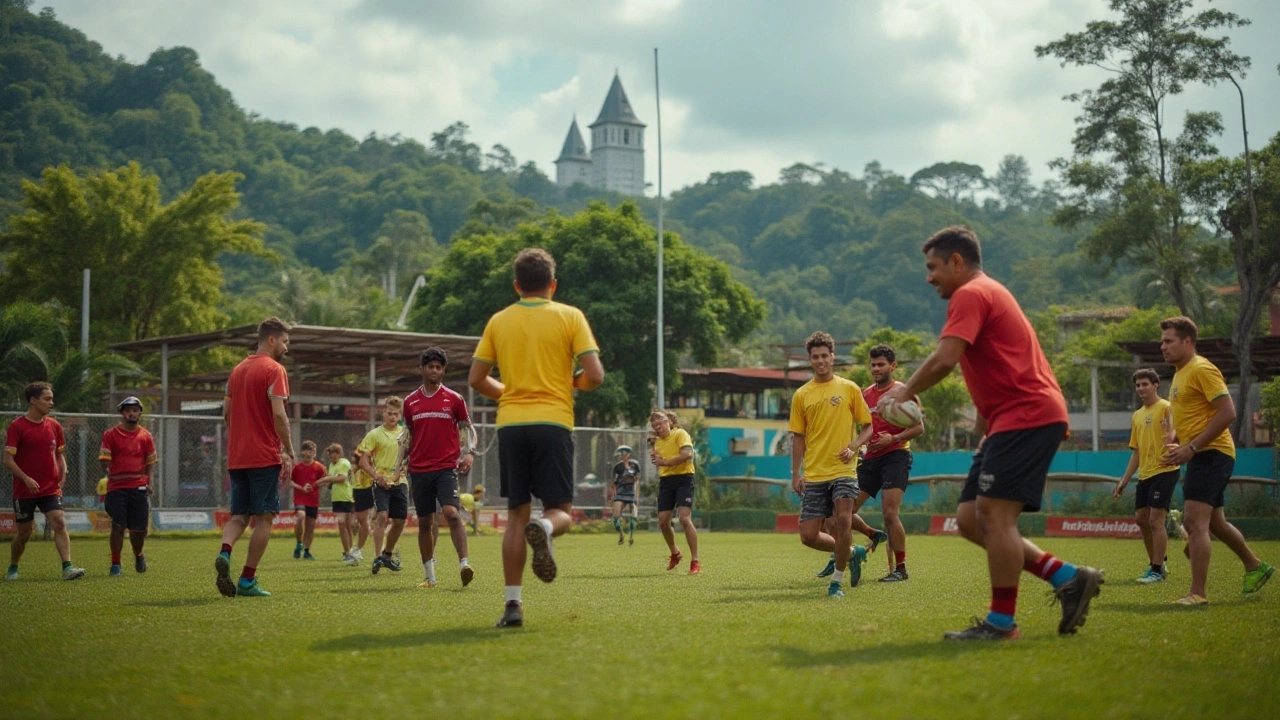
Growing Popularity of Rugby
In recent years, the rise of rugby in Brazil has been nothing short of remarkable. While it may not have reached the legendary status of soccer, the sport has steadily climbed the ranks of popularity thanks to a combination of strategic promotion, increased exposure, and grassroots efforts. The turning point came with rugby's inclusion in the 2016 Rio de Janeiro Olympics, where the mesmerizing display on home soil captured the imagination of local fans. It was the first time many Brazilians had the chance to experience the fast-paced, thrilling matches that rugby is known for, creating a spike in interest that has continued to grow.
Brazil's geographical and cultural diversity provides a fertile ground for the expansion of rugby. Schools and local clubs have become incubators for budding young talents eager to understand the mechanics behind rucks and scrums. Several initiatives have launched rugby programs designed to teach the sport from the basics. The Brazilian Rugby Confederation (CBRu) has been pivotal, crafting partnerships with schools to integrate rugby into physical education classes. CBRu's outreach programs aim to demystify the sport and make it accessible to children of all ages and backgrounds, nurturing the next generation of players.
The popularity of international and club-level tournaments like the Six Nations and the Rugby World Cup has also helped in drawing new fans. Enthusiasts now have the chance to follow Brazilian teams competing on international stages, seeing the sport as a bridge connecting Brazil to the wider world. Many believe that the adaptability and athleticism characteristic of Brazilian players can translate into success on the rugby pitch. This sentiment was echoed by former national rugby sevens captain André "Boy" Parodi, who shared, "Brazilians have a natural aptitude for rugby. Our natural speed and agility make us formidable opponents."
While Brazil is home to a myriad of sports, the charm of rugby lies in its enduring sense of community and camaraderie. Fans frequently gather at local pubs and community centers to watch games, fostering strong bonds over shared interests. This communal feeling is replicated on the field, where players of all levels, from beginners to professionals, find a space that is both competitive and inclusive. As such, rugby offers an alluring alternative to those who crave the mix of physicality and skill inherent to the game.
The social media revolution has also played a crucial role in rugby's rise. Platforms like Instagram and TikTok are brimming with clips of great tackles, skillful footwork, and discussion panels, attracting a diverse range of viewers. This digital engagement offers a new avenue for fans to learn about rugby rules, tactics, and even fitness regimes related to the sport. As a sport with a relatively uncomplicated set-up, rugby can thrive within communities that may not have access to ample resources or facilities, boosting its accessibility across various socioeconomic backgrounds.
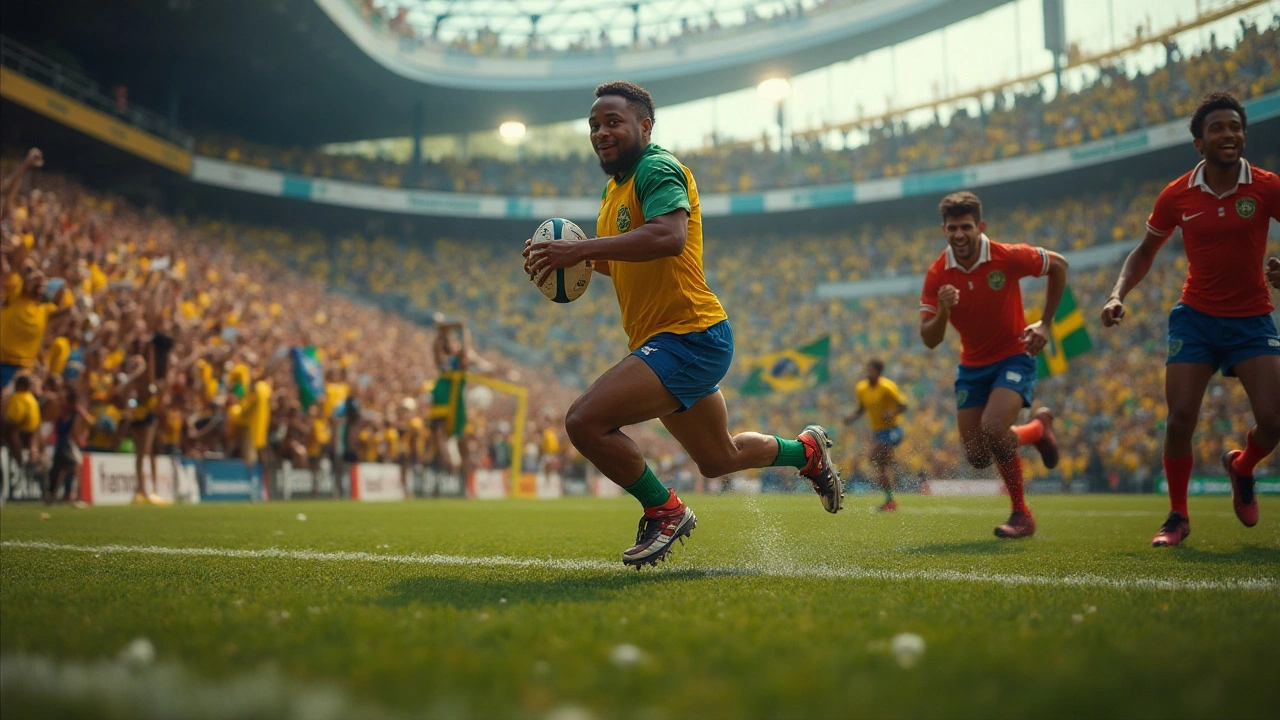
Key Figures and Teams
In the vibrant tapestry of rugby in Brazil, several key players and teams stand out, each contributing uniquely to the sport’s growing prestige. At the heart of Brazil's rugby resurgence are passionate athletes, visionary coaches, and dedicated officials who are determined to carve a niche for rugby alongside giants like soccer and volleyball. Notably, Lucas Duque, affectionately nicknamed ‘Tanque’, the captain of the national team, has been instrumental in bringing rugby to the limelight. His leadership on the field is matched by his enthusiasm off it, as he engages in community outreach programs and hosts workshops for budding players. Brazilian rugby's journey is closely linked with Duque's rise, his story echoing the sport's broader aspirations.
The professional scene in Brazil is burgeoning, with notable teams that are making significant strides. Among them, the Jacareí Rugby Club is distinguished not only for its competitive spirit but also for its grassroots training programs. Founded in 2003, this club has become a beacon for aspiring talent, creating a well-structured path for young players eager to make their mark. Their success is mirrored by teams like SPAC and Niterói, which not only compete at a high level but also prioritize player development and community involvement. SPAC holds a unique place in history as it was established back in 1893, highlighting the enduring relationship between Brazil and rugby.
An equally important facet of Brazilian rugby is the influence of internationally trained coaches who bring their expertise to local teams. These coaches are pivotal in elevating the tactical and technical aspects of the sport in Brazil, combining local fervor with global strategies. They create dynamic playbooks that leverage Brazil's natural athleticism while fostering discipline and precision. Many hold workshops and training camps which have become instrumental in shaping a new generation of rugby enthusiasts. According to a prominent rugby analyst, "Brazil's rugby teams, with their rich diversity of players and styles, are on the cusp of something remarkable, with a real potential to challenge traditional powerhouses in future tournaments."
This sentiment captures the community's optimism and the growing belief in Brazil's rugby potential.
The trajectory of Brazil's rugby owes a lot to hidden figures working behind the scenes. Federations and clubs often collaborate to organize local tournaments and leagues, which are pivotal in sustaining the sport's momentum. The Brazilian Rugby Association (CBRu) plays a crucial role in this dynamic, undertaking initiatives to promote rugby in schools and support programs that introduce the sport to newcomers in various regions. With Olympics participation as a catalyst, amateur leagues have seen an upsurge in participation, suggesting that this growth trend is likely to continue. The resonance of rugby in the country is steadily building, laying a robust foundation for even greater achievements on the international stage.
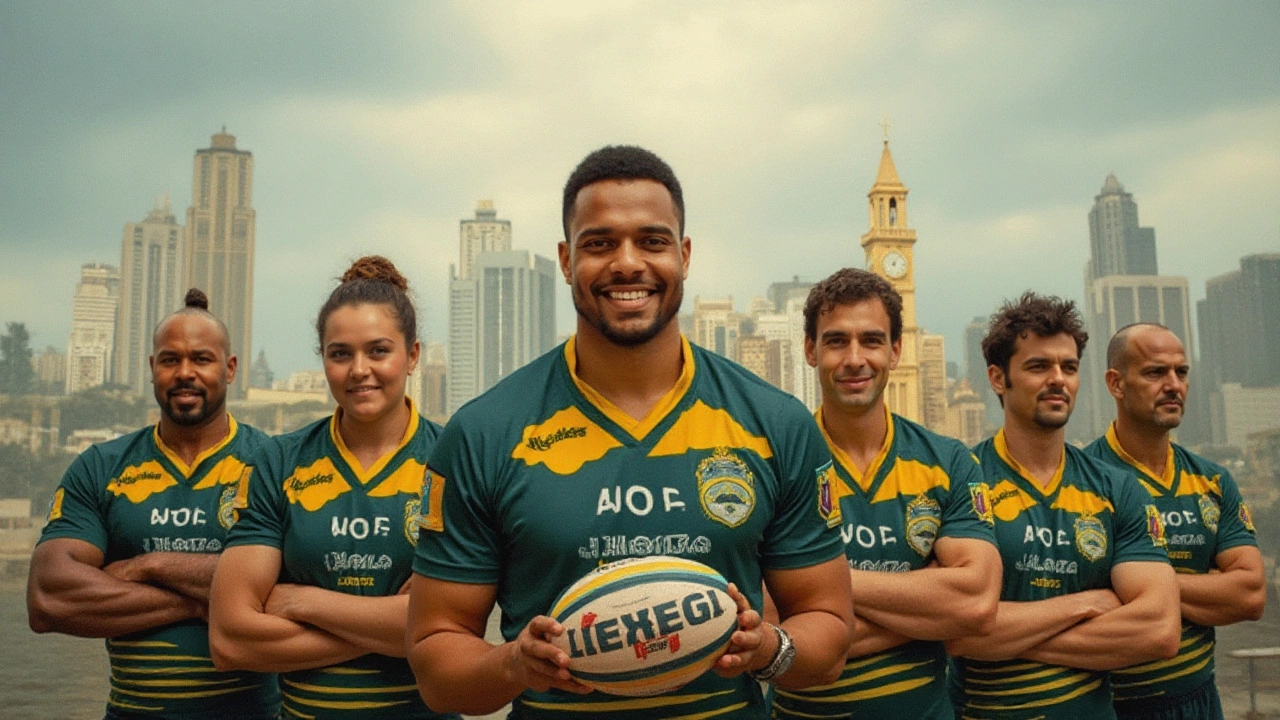
Future Prospects and Opportunities
As Brazil embraces rugby, the landscape is bursting with potential for growth and development. The sport's rise, though not as meteoric as that of soccer, reflects a gradual increase in both interest and expertise. This expansion can largely be attributed to strategic investments made by clubs and federations that are keen on nurturing local talent. With aspirations of becoming a formidable force in international competitions, there is a strong focus on youth development programs and grassroots initiatives to introduce the sport to a younger audience.
The Brazilian Rugby Confederation has been pivotal in this transformation, working diligently to enhance the infrastructure and resources available to up-and-coming rugby athletes. They've been hosting clinics, partnering with schools, and engaging with the community to foster a culture of sportsmanship around rugby. The schools themselves are playing a crucial role by incorporating rugby into physical education curriculums, thus ensuring that students receive exposure from a young age. These efforts are paving the way for a future where rugby in Brazil rivals more traditional sports in popularity.
International collaborations also play a significant role in this sporting phenomenon. By forming alliances with rugby-rich nations, Brazilian teams are availing themselves of training programs, exchange schemes, and expert coaching, all of which contribute significantly to honing the skills of local players. In recent years, we have witnessed an impressive influx of international coaches who bring fresh perspectives and techniques that resonate well with the Brazilian spirit of innovation and adaptability. This cross-pollination not only improves the standards of play but also bridges cultural differences, creating a vibrant community around the sport.
“The potential for rugby in Brazil is enormous,” says Agustin Danza, CEO of the Brazil Rugby Confederation. “With our passion and talent, there is no limit to what we can achieve on the world stage.”
The inclusion of rugby sevens in the Olympic Games has also opened new doors for Brazilian rugby. This platform provides an opportunity for athletes to showcase their skills on a global stage, challenging the stereotype of Brazil as a soccer-only nation. Encouraging results in international tournaments have sparked national pride and fueled aspirations of more frequent appearances on international podiums. The Olympics have undoubtedly driven an increased public interest, offering athletes a prestigious goal to strive towards.
Looking ahead, the future prospects for women's rugby in Brazil are equally promising. The women's team has already tasted success on the international circuit, propelling efforts to amplify investment and attention in this segment. Their achievements highlight the potential for gender-inclusive growth within the sport, a testament to the country's progressive sporting culture. These developments represent a significant step forward in establishing a more equitable platform where all athletes, regardless of gender, can thrive.
